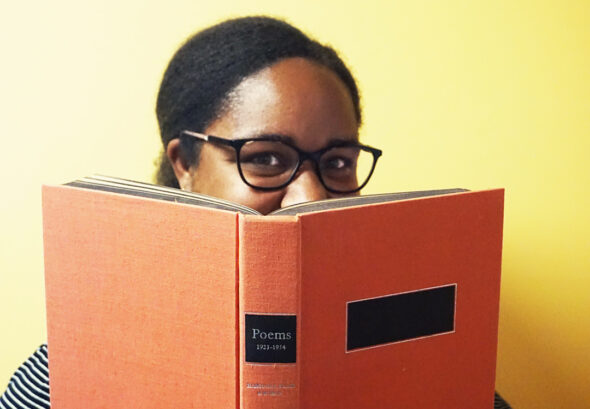
News writer and reporter Jessica Thomas' new column, "Unsolicited Opinions," opens up space dedicated to her opinions, books and sometimes other things. (Photo by Reilly Dixon)
Unsolicited Opinions | Why we still need Toni Morrison
- Published: September 8, 2022
While the title of this column may seem flip, it is important to realize that there isn’t generally much space in a newspaper for its staff to offer their opinion. As a reporter, I often get to write about topics I have some interest in, but my job is to remain objective, and I try to do so. That said, this space is dedicated to my opinions, sometimes about books, and sometimes about other things.
Thanks for reading!
I recently started taking a class where we are being asked to think about stories and their timing. One of the first readings was an essay by Cheryl Savageau called “Stories, Language and the Land.” One of the most compelling questions in the essay asks readers to think about story as a living reflection of cultural values. Savageau asks: “Why did this story wake up now?” The question offers readers a chance to think about the process of storytelling as something that is both specific to a certain time, and timeless enough that a story can be retold when it is most needed.
As I considered this question, I immediately thought about Toni Morrison’s novel “Beloved.” Published in 1987, “Beloved” is the story of former slaves and their descendants — who are haunted by the ghost of Beloved, a baby girl whose mother, Sethe, killed her to avoid turning the baby over to slave catchers. While the haunting of 124 (the house where the main characters live) and what leads up to it is the main story, it is the background of Paul D, one of the former slaves, that pops into my head when I think about a story coming alive at a specific time and for a specific purpose. In the story, Paul D is imprisoned in a Georgia chain gang, where prisoners were used for free labor, a practice that is continued to this day.
So, why did “Beloved” wake up in 1987? Well, the 1980s, much like today, were a time when the U.S. saw a huge uptick in imprisonment of Black people. The 1980s birthed the for-profit, private prison system and Reagan-era economics where Black and brown people who may have experienced a reprieve from institutional racism with the death of Jim Crow faced a new type of racism through the carceral system. I think that Morrison added this section about incarceration to show its links to chattel slavery, warning us of the evils of imprisoning people for free labor.
Today, almost three years and one month after the death of Morrison, her novels, including “Beloved,” have reentered the public discourse as we see pundits and public figures decry her work as being a part of a critical race theory plot. At the same time, state governments are funneling millions of dollars into police budgets, giving them tools to further surveille citizens through the lenses of body cameras and other audio and video recording equipment attached to police vehicles that run constantly.
While teachers are losing their jobs and licenses for giving students access to “banned books,” “Beloved” is being picked up by a new generation of readers — readers who may read the novel and realize that the institutions Morrison writes about are not only alive, but are being given bloated budgets to send Black and brown bodies to prison. In other words, “Beloved” and other books, like Colson Whitehead’s “The Nickel Boys,” are waking up, teaching us our history and holding up a mirror.
At the end of “Beloved,” there is a reckoning, and the narrator tells readers: “This is not a story to pass on.” For decades, critics have analyzed the meaning of this line; while I am just another person with an opinion, I think it is important to see how the instructive nature of the line tells us not to continue these ways of life that have devastated generations of families. Their experience — slavery, incarceration and much more — should not be something later generations are experiencing.
The power of Morrison’s oeuvre is great, but it is up to us to take her work, interpret it and apply it to our modern moment. So, maybe you’ve never read “Beloved,” or maybe you haven’t read it in years. Go on down to the library or your favorite local bookshop and pick up a copy.
One Response to “Unsolicited Opinions | Why we still need Toni Morrison”
The Yellow Springs News encourages respectful discussion of this article.
You must login to post a comment.
Don't have a login? Register for a free YSNews.com account.












Woot. Woot! Nice work, Kiddo!!